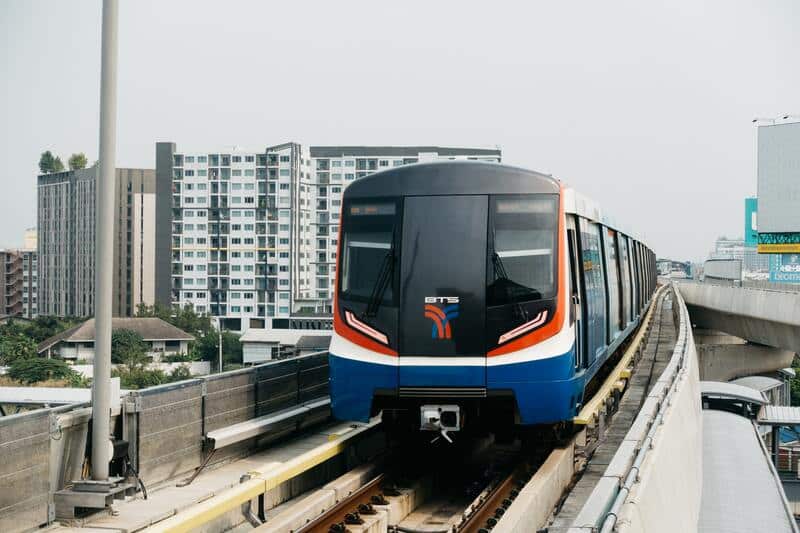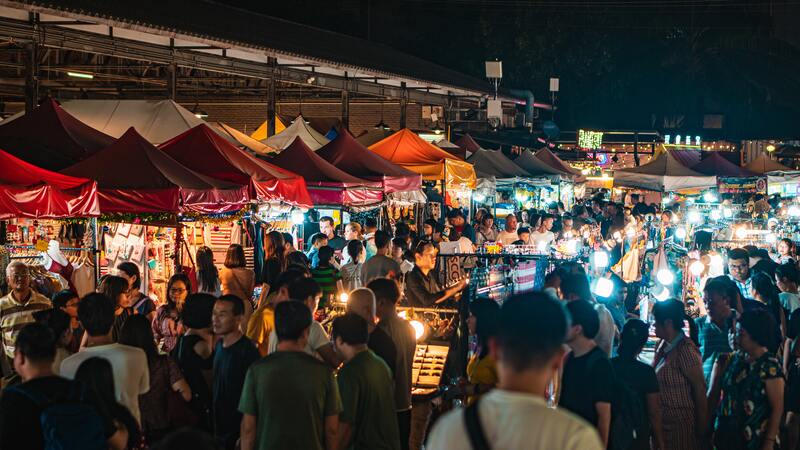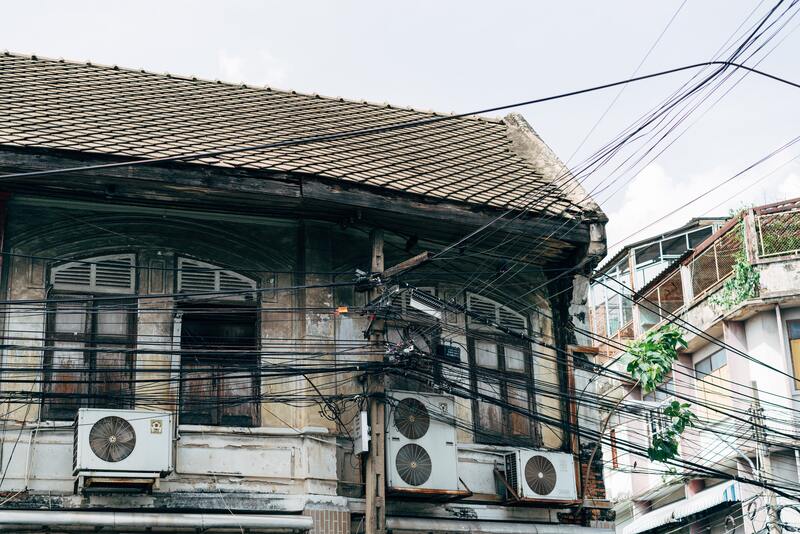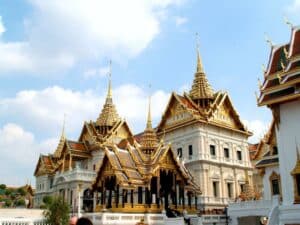A thorough understanding of the cost of living in Thailand for expats is an important part of moving to the county.
With a range of expenses to consider, including accommodation, food, transportation, and health care, it’s essential to have a solid grasp of the financial implications of this decision.
In this blog, we aim to provide valuable insights and tips for expats looking to manage their expenses and live comfortably in Thailand.
So, whether you are already living in Thailand or planning to relocate soon, read on to discover how to make the most of your expat experience while keeping your expenses under control.
If you are looking to invest as an expat or high-net-worth individual, which is what I specialize in, you can email me (advice@adamfayed.com) or WhatsApp (+44-7393-450-837).
Table of Contents
Rent a smaller apartment or house
Accommodation is a major expense that affects the cost of living in Thailand for expats, and it can be tempting to go for a larger, more luxurious apartment or house.
However, opting for a smaller and more modest accommodation can help you save a significant amount of money on rent and utilities.
The cost of rent can vary greatly depending on the location, size, and quality of the accommodation.
For example, an expat living in a central area of Bangkok can expect to pay a higher rent than someone living in a smaller city or rural area.
By choosing a smaller apartment or house, you can reduce your monthly rent payments and save money that can be used for other expenses.
In addition to saving on rent, a smaller accommodation also means lower utility bills. Electricity bills can be high in Thailand, especially during the hot season when air conditioning is needed.
By choosing a smaller space, you can save money on your electricity bill as you will need to use less energy to cool or heat your home.
Furthermore, smaller accommodations are often located in more affordable neighborhoods, which can save you money on groceries, transportation, and other expenses.
It is important to consider the location when choosing a smaller apartment or house to ensure that it is convenient and safe.
Cooking at home to lessen cost of living in Thailand for expats
Thailand is known for its delicious and diverse food culture, and it can be tempting for expats to eat out frequently.
However, eating out regularly can quickly add up and increase the cost of living in Thailand for expats. By cooking at home, expats can save money on food expenses and have greater control over their diet and nutrition.
Cooking at home can be a cost-effective option, as grocery stores and markets in Thailand offer a wide variety of fresh and affordable ingredients.
By shopping at local markets and supermarkets, expats can buy ingredients in bulk and save money on their grocery bills. In addition, cooking at home can be a great way to use up leftovers and reduce food waste.
Cooking at home also allows expats to have greater control over what they eat. They can choose to prepare healthier meals with fresh ingredients, avoid unhealthy additives or preservatives, and accommodate any dietary restrictions or preferences.
This can be particularly important for expats who may struggle to find food options that meet their specific dietary needs or preferences when eating out.
Moreover, cooking at home can be a fun and social activity. Expats can invite friends over for a home-cooked meal, host potluck dinners, or even try their hand at cooking traditional Thai dishes.
Not only does this offer a cost-effective alternative to eating out, but it also allows expats to connect with local culture and people.

Use public transportation
Owning and maintaining a car in Thailand can have a significant impact on cost of living in Thailand for expats. Gasoline prices can be high, especially in urban areas, and parking fees can add up quickly.
In addition, maintaining a car can be expensive due to the cost of repairs, insurance, and registration fees. By using public transportation instead, expats can save money on these expenses and also reduce their environmental impact.
Public transportation in Thailand is affordable and accessible, with options including buses, trains, and the BTS (Bangkok Mass Transit System).
The BTS is a popular option for expats living in Bangkok, as it provides a fast, reliable, and affordable way to navigate the city.
In addition, the BTS connects to other public transportation systems, such as buses and boats, making it easy to travel to different parts of the city.
Using public transportation can also save expats time, as they can avoid traffic congestion and the time it takes to find parking. This can be especially beneficial in cities like Bangkok, where traffic can be notoriously congested, and parking can be difficult to find.
Furthermore, using public transportation can be a great way for expats to experience local culture and meet new people.
Riding public transportation provides opportunities to interact with locals and observe daily life in Thailand.
Shopping at local markets to cut cost of living in Thailand for expats
Shopping at local markets is a great way to save money on groceries and cut cost of living in Thailand for expats.
Local markets offer a wide variety of fresh produce and other food items at affordable prices, and the experience of shopping at a market can also provide a glimpse into Thai culture.
Local markets in Thailand are often open-air and can be found in every town and city. They offer a variety of fresh fruits, vegetables, meats, and seafood, as well as snacks and street food.
Many markets also sell household items, clothing, and other products at lower prices than retail stores.
By shopping at local markets, expats can save money on groceries and also support local farmers and small businesses.
Prices at local markets are often lower than those at supermarkets and other retail stores, and the quality of the produce is often higher as well.
Shopping at local markets can also provide an opportunity for expats to practice their Thai language skills and interact with local vendors.
Many vendors are happy to chat with customers and offer advice on how to prepare and cook their products.
Avoid tourist areas
Thailand is a popular tourist destination, and there are many areas of the country that are popular with visitors. The choice of location can affect the cost of living in Thailand for expats.
While these areas can be attractive to expats, they can also be more expensive than other parts of the country. By avoiding tourist areas, expats can save money on accommodation, food, and other expenses.
Tourist areas in Thailand often have higher prices for goods and services, as they cater to visitors who are willing to pay more for convenience and luxury.
This can be especially true for accommodation, where prices can be significantly higher than in other parts of the country.
Food and drink can also be more expensive in tourist areas, with restaurants and bars often charging higher prices for their products.
Furthermore, tourist areas can be more expensive for transportation, tours, and other activities.
Seek out alternative options, such as public transportation and local attractions, expats can save money and have a more authentic experience of Thailand.
Avoiding tourist areas can also provide an opportunity for expats to experience local culture and meet new people.
Exploring less-traveled areas of the country, expats can immerse themselves in the local culture and discover hidden gems that are not as well-known to tourists.

Negotiating price to minimize cost of living in Thailand for expats
Negotiating prices is a common practice in Thailand and can be a great way for expats to save money on goods and services. This can ultimately help minimize the cost of living in Thailand for expats.
In thee country barganing is often expected, especially in markets and smaller shops. Vendors may start with a higher price than they are willing to accept, and negotiating can be seen as a friendly and expected part of the transaction.
When negotiating, it is important to be polite and respectful. Bargaining is often seen as a social activity, and friendly conversation can be part of the negotiation process.
It is also important to have a sense of the market value of the goods or services in question, as this can help you determine a fair price.
Bargaining can also be effective when it comes to expenses such as rent and transportation.
For example, when renting an apartment or house, it may be possible to negotiate a lower rent if you commit to a longer lease or if you offer to pay several months’ rent in advance.
Negotiating can also provide an opportunity for expats to connect with locals and learn more about Thai culture.
By engaging in friendly conversation and bargaining, expats can build relationships and gain insight into local customs and traditions.
Take advantage of free or low-cost activities
Thailand offers a wealth of opportunities for expats to explore and experience its rich culture and natural beauty.
Many of these experiences are free or low-cost, making them a great option for expats looking to save money on entertainment and lessen the cost of living in Thailand for expats.
One popular free activity in Thailand is visiting temples. Thailand is home to numerous temples, and many of them are open to the public for free or for a small donation.
Visiting temples can be a great way to learn about Thai culture and history and to witness the stunning architecture and art of the temples.
Hiking is another free or low-cost activity in Thailand. There are many national parks and trails throughout the country that offer opportunities for hiking and trekking. Hiking can be a great way to experience Thailand’s natural beauty and get some exercise at the same time.
Public parks are also a great option for free or low-cost entertainment. Many cities in Thailand have public parks with amenities such as playgrounds, sports facilities, and picnic areas.
Visiting a public park can be a great way to spend time with friends and family or simply relax and enjoy the outdoors.
There are many other free or low-cost options for entertainment in Thailand. These can include visiting markets, attending cultural events, or exploring local neighborhoods.
Use a prepaid mobile plan
Using a prepaid mobile plan in Thailand can be a great way for expats to save money on their phone bills.
Prepaid plans offer many benefits and can be a cost-effective option for those who don’t need a lot of data or minutes.
Prepaid plans in Thailand are available from a variety of mobile network operators and can be purchased at many retail stores and online.
Prepaid plans typically allow you to pay in advance for a set amount of data, minutes, and texts. Once you have used up the allotted amount, you can easily top up your account with additional credit.
One of the main advantages of a prepaid plan is that you have control over your spending. With a prepaid plan, you only pay for what you need, and there are no surprises at the end of the month.
This can be especially beneficial for expats who are on a tight budget and want to avoid unexpected expenses and cut the cost of living in Thailand for expats.
Prepaid plans in Thailand are also often more affordable than postpaid plans. Prepaid plans typically have lower monthly fees and may offer discounts for topping up in larger amounts.
It can also be a great option for expats who are only staying in Thailand for a short period of time.
Rather than signing up for a long-term contract, expats can simply purchase a prepaid plan for the duration of their stay and avoid any cancellation fees.
Invest in a fan instead of air conditioning
Air conditioning is essential in Thailand, especially during the hot and humid summer months.
However, running air conditioning units can be expensive and can significantly increase electricity bills. Using a fan instead of air conditioning saves money on their electricity bills, reduces their environmental impact, and cuts the cost of living in Thailand for expats.
Fans are a more affordable alternative to air conditioning and can be found in many different sizes and styles. They consume less energy than air conditioning units, which means they are more cost-effective and energy-efficient.
A ceiling fan or standing fan can effectively cool a room without the high electricity costs associated with air conditioning.
Moreover, fans are also more environmentally friendly than air conditioning.
Air conditioning units use refrigerants that are harmful to the environment, and the energy used to power air conditioning contributes to climate change. With fans, expats can reduce their carbon footprint and promote sustainability.
Additionally, using a fan can also have health benefits. Fans circulate air and can help to alleviate symptoms of allergies and respiratory conditions.
They can also help to prevent the spread of airborne illnesses by circulating fresh air.

Consider health insurance
Healthcare costs in Thailand can be high, especially for expats who may not be eligible for the public healthcare system.
Without proper coverage, expats may face significant expenses for medical treatments and procedures. Investing in health insurance can help expats save money on medical expenses in the long run and have peace of mind knowing that they are covered in the event of illness or injury.
There are several types of health insurance plans available in Thailand, including international health insurance and local insurance plans.
International health insurance plans are designed for expats and offer coverage for medical treatments and procedures both in Thailand and abroad.
Local insurance plans are designed for Thai nationals but may also be available to expats who meet certain requirements.
Aside from helping lessen the cost of living in Thailand for expats, investing in health insurance can provide many benefits. For example, health insurance can cover the costs of hospitalization, surgery, and other medical treatments.
This can be especially important for expats who may face unexpected medical expenses while living abroad.
Health insurance can also provide coverage for preventative care, such as annual check-ups and vaccinations, which can help to maintain good health and prevent more serious health issues down the line.
Moreover, health insurance can also provide access to quality health care. With health insurance, expats can access private hospitals and clinics, which often provide better medical care and facilities than public hospitals.
This can be especially important for expats who may have specific medical needs or require specialized treatment.
Pained by financial indecision? Want to invest with Adam?

Adam is an internationally recognised author on financial matters, with over 760.2 million answer views on Quora.com, a widely sold book on Amazon, and a contributor on Forbes.



